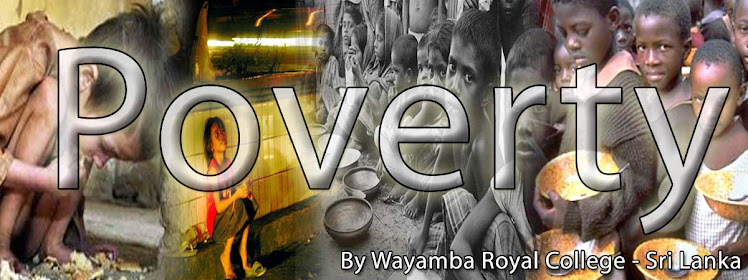
Poverty's effect seems to be the strongest when it occurs early in the child's life,when it is persistent, and when children live well below the poverty threshold.
Poverty may influence child development through at least five pathways:
1.Child health and nutrition
2.Parent mental health and affective interactions
3.Provision of a stimulating home environment
4.School and child care quality
5.Neighbor-hood conditions.
Parental mental health and affective interactions.
Parents who are poor or who have a history of welfare receipt are more likely to have worse emotional and physical health than those who are not poor. Researchers such as Rand Conger and colleagues, using the family stress model, have linked parental depressive symptoms to more conflict with adolescent children, which in turn results in less optimal emotional, social, and cognitive outcomes. Poor parental mental health also is associated with less stimulating home environments and more discordant parent-child interactions.
Provision of a stimulating home environment.
Family income directly influences the material resources available to children in their homes. Higher income children benefit from higher levels of cognitively stimulating materials available in their homes compared to low-income children. The provision of a stimulating home environment, in turn, accounts for much of the effect of income on the cognitive development of preschool and elementary school children and may be the most important pathway through which poverty operates.
School and child care quality.
Children from poor families are also exposed to lower quality school and child care settings compared to their non-poor counterparts. Findings from two national child care studies, as described by Deborah Phillips et al. (1994), indicate that up to 60 percent of subsidized and low-income child care centers failed to conform to legal child to staff ratios in toddler classrooms and most (70%) received low ratings on scales of appropriate caregiving and the provision of appropriate activities. Lower quality child care is associated with lower math and language ability, negative peer interactions, and more behavior problems.
Neighborhood conditions.
The neighborhoods in which poor families reside are another pathway through which income poverty may negatively affect children's educational outcomes. Financial strain limits the housing and neighborhood choices available to low-income families, constraining these families to live in neighborhoods characterized by high levels of crime and unemployment, low levels of resources, and a lack of collective efficacy among the residents. Neighborhood residence, in turn, is associated with child and adolescent school outcomes above and beyond the effect of family poverty.



Initially the children lack education, later on their whole lives become restless and disgusting :(
ReplyDeleteThis comment has been removed by the author.
ReplyDeleteYup,it might cause for the world economy in near future..It might be for a worst thing like declination of the world economy.
ReplyDelete